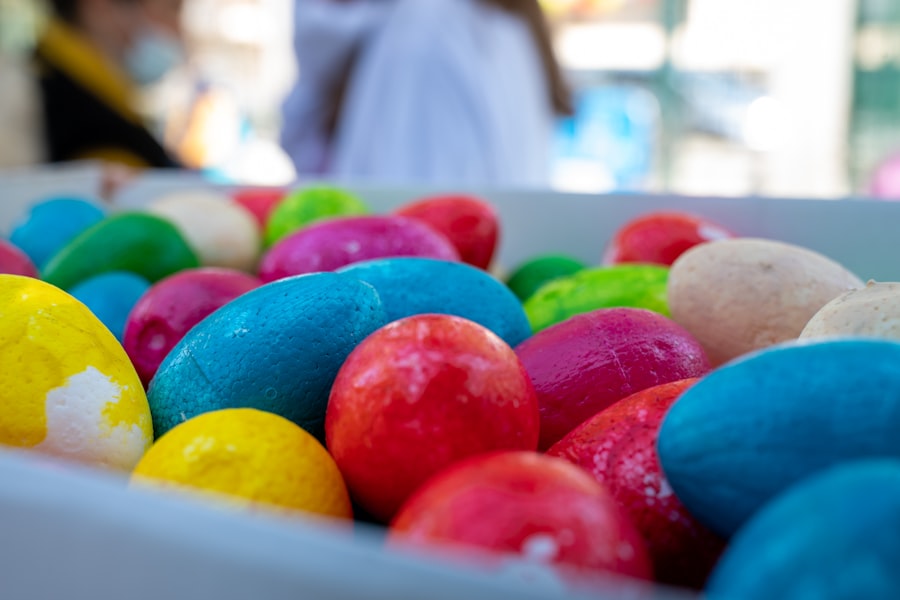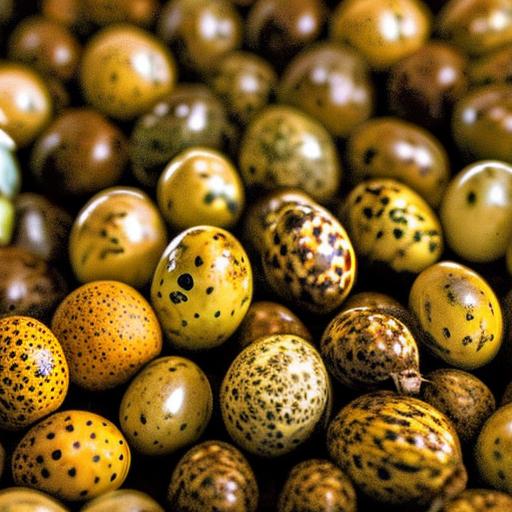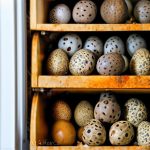Quail eggs have been consumed for centuries and are a popular delicacy in many parts of the world. They are smaller in size compared to chicken eggs, with a unique spotted pattern on their shells. Quail eggs are known for their rich, creamy yolk and delicate flavor, making them a favorite among food enthusiasts and chefs alike. These tiny eggs are not only delicious but also packed with nutrients, including high levels of protein, vitamins, and minerals. They are also lower in cholesterol compared to chicken eggs, making them a healthier alternative for those watching their cholesterol intake. Quail eggs can be enjoyed in a variety of ways, from being boiled, fried, pickled, or used as a garnish in salads and appetizers. Their versatility and nutritional value make them a valuable addition to any diet.
Quail eggs are also popular in traditional medicine and are believed to have various health benefits, including improving immunity, promoting healthy skin, and boosting energy levels. In some cultures, quail eggs are considered to be an aphrodisiac and are consumed to enhance fertility and libido. With their growing popularity and numerous health claims, it’s important to understand how to properly store, handle, and use quail eggs to ensure their freshness and safety.
Key Takeaways
- Quail eggs are small, nutritious eggs that are gaining popularity for their health benefits and unique flavor.
- Quail eggs should be stored in the refrigerator at a consistent temperature to maintain their freshness and quality.
- The shelf life of quail eggs is relatively short, typically around 3-4 weeks from the laying date.
- A freshness test for quail eggs can be done by placing them in a bowl of water – fresh eggs will sink, while older eggs will float.
- Safety precautions for keeping quail eggs include proper handling, washing before use, and avoiding cross-contamination with other foods.
- Quail eggs can be used in a variety of dishes, including salads, appetizers, and as a garnish for soups and main courses.
- In conclusion, quail eggs are a versatile and nutritious ingredient that can be enjoyed in a wide range of culinary applications.
Storage of Quail Eggs
Proper storage is crucial in maintaining the quality and freshness of quail eggs. When stored correctly, quail eggs can last for several weeks without spoiling. The ideal storage temperature for quail eggs is between 45-50 degrees Fahrenheit (7-10 degrees Celsius). It’s important to store quail eggs in a cool and dry place, away from direct sunlight and strong odors. The best way to store quail eggs is in the refrigerator, where they can be kept in their original carton or transferred to an egg holder to prevent breakage. Storing quail eggs with the pointed end facing downward can help maintain their freshness by keeping the air cell at the top of the egg.
It’s important to note that quail eggs should not be washed before storage, as they have a natural protective coating that helps prevent bacteria from entering the egg. Washing quail eggs can remove this protective layer and increase the risk of contamination. Additionally, quail eggs should be stored away from foods with strong odors, as they can easily absorb surrounding smells. By following these storage guidelines, quail eggs can be kept fresh and safe for consumption for an extended period.
Shelf Life of Quail Eggs
Quail eggs have a relatively long shelf life when stored properly. When kept in the refrigerator at the recommended temperature of 45-50 degrees Fahrenheit (7-10 degrees Celsius), quail eggs can remain fresh for up to 5-6 weeks. However, it’s important to note that the shelf life of quail eggs can vary depending on their freshness at the time of purchase. It’s best to consume quail eggs within 2-3 weeks of purchase for the best quality and flavor.
To determine the freshness of quail eggs, it’s important to check the expiration date on the carton or use-by date if provided. Additionally, performing a freshness test can help assess the quality of quail eggs before consumption. By conducting a simple water test or candling test, consumers can identify any potential spoilage or aging of the eggs. Understanding the shelf life of quail eggs is essential in ensuring their safety and enjoyment.
Freshness Test for Quail Eggs
Performing a freshness test is a simple yet effective way to determine the quality of quail eggs before consumption. One common method is the water test, where quail eggs are placed in a bowl of water to assess their freshness. Fresh quail eggs will sink and lay flat on the bottom of the bowl, indicating that they are still good for consumption. If the quail eggs stand upright at the bottom of the bowl or float to the surface, it’s a sign that they are no longer fresh and should be discarded.
Another method for testing the freshness of quail eggs is the candling test, which involves shining a bright light through the egg to examine its contents. Fresh quail eggs will have a clear and well-defined yolk and albumen, with no visible discoloration or abnormalities. Any signs of cloudiness, dark spots, or unusual odors indicate that the egg is no longer fresh and should not be consumed.
By performing these simple freshness tests, consumers can ensure that they are consuming high-quality and safe quail eggs.
Safety Precautions for Keeping Quail Eggs
While quail eggs offer numerous health benefits and culinary possibilities, it’s important to observe safety precautions when handling and consuming them. One key consideration is to always purchase quail eggs from reputable sources to ensure their quality and safety. It’s also important to check for any cracks or damage to the eggshell before purchasing or consuming quail eggs.
Proper hygiene is essential when handling quail eggs, as they can be susceptible to contamination from bacteria such as Salmonella. It’s important to wash hands thoroughly before and after handling quail eggs to prevent the spread of bacteria. Additionally, utensils and surfaces that come into contact with raw quail eggs should be cleaned and sanitized to avoid cross-contamination.
When consuming quail eggs, it’s important to cook them thoroughly to kill any potential bacteria. While some may enjoy consuming raw or undercooked quail eggs, it’s recommended to cook them to an internal temperature of 160 degrees Fahrenheit (71 degrees Celsius) to ensure their safety.
By following these safety precautions, consumers can enjoy the nutritional benefits and delicious flavor of quail eggs while minimizing the risk of foodborne illness.
Uses for Quail Eggs

Quail eggs are incredibly versatile and can be used in a wide range of culinary applications. They are commonly enjoyed as a standalone snack or appetizer, either boiled and seasoned with salt or pickled for a tangy flavor. Quail eggs can also be used as a garnish for salads, soups, and canapés, adding a decorative touch and rich flavor to dishes.
In addition to being enjoyed on their own, quail eggs are popular in various recipes, including omelets, frittatas, and baked goods such as cakes and pastries. Their small size makes them ideal for incorporating into bite-sized dishes and hors d’oeuvres, adding a touch of elegance and flavor.
Quail eggs are also commonly used in Asian cuisine, where they are incorporated into dishes such as sushi, ramen, and stir-fries. Their delicate flavor and creamy texture complement a wide range of ingredients and cooking styles, making them a favorite among chefs and home cooks alike.
Furthermore, quail eggs are often used in traditional medicine and natural remedies for their purported health benefits. They are believed to have immune-boosting properties and are used in various tonics and elixirs in some cultures.
Overall, the uses for quail eggs are diverse and plentiful, making them a valuable ingredient in both culinary and holistic practices.
Conclusion and Final Thoughts
Quail eggs are a unique and nutritious food that offers a wide range of culinary possibilities and potential health benefits. When stored properly in a cool and dry environment, quail eggs can maintain their freshness for several weeks, providing ample time for consumption. By performing simple freshness tests such as the water test or candling test, consumers can ensure that they are consuming high-quality quail eggs.
It’s important to observe safety precautions when handling and consuming quail eggs to minimize the risk of foodborne illness. Proper hygiene, thorough cooking, and purchasing from reputable sources are essential practices for ensuring the safety of quail eggs.
The uses for quail eggs are diverse and abundant, ranging from standalone snacks to incorporation into various recipes and traditional remedies. Their delicate flavor and rich nutrient content make them a valuable addition to any diet.
In conclusion, quail eggs are a small but mighty food that offers both culinary delight and potential health benefits. With proper storage, handling, and usage, consumers can enjoy the unique flavor and nutritional value of quail eggs with confidence in their safety and quality.
Quail eggs are a delicacy with a unique flavor, but many people wonder how long they can be kept fresh. According to a recent article on PoultryWizard.com, proper storage is key to preserving the freshness of quail eggs. The article provides valuable insights into the best practices for storing and preserving quail eggs, ensuring that they remain safe to eat for an extended period. For more information on creating the ideal environment for your poultry, check out their informative article on chicken coop run plans.
FAQs
How long can you keep quail eggs?
Quail eggs can be kept for up to 2 weeks if stored properly.
What is the best way to store quail eggs?
The best way to store quail eggs is to keep them in the refrigerator at a temperature of around 45-50°F (7-10°C).
Can quail eggs be frozen?
Yes, quail eggs can be frozen for up to 1 month. It is best to crack the eggs and remove them from their shells before freezing.
How can you tell if quail eggs are still fresh?
You can tell if quail eggs are still fresh by performing the water test. Place the eggs in a bowl of water – if they sink to the bottom and lay flat on their sides, they are fresh. If they stand upright or float, they are not fresh and should be discarded.
Are there any signs that quail eggs have gone bad?
Yes, signs that quail eggs have gone bad include a foul odor, a change in color, or a slimy texture. If you notice any of these signs, it is best to discard the eggs.
Meet Walter, the feathered-friend fanatic of Florida! Nestled in the sunshine state, Walter struts through life with his feathered companions, clucking his way to happiness. With a coop that’s fancier than a five-star hotel, he’s the Don Juan of the chicken world. When he’s not teaching his hens to do the cha-cha, you’ll find him in a heated debate with his prized rooster, Sir Clucks-a-Lot. Walter’s poultry passion is no yolk; he’s the sunny-side-up guy you never knew you needed in your flock of friends!







